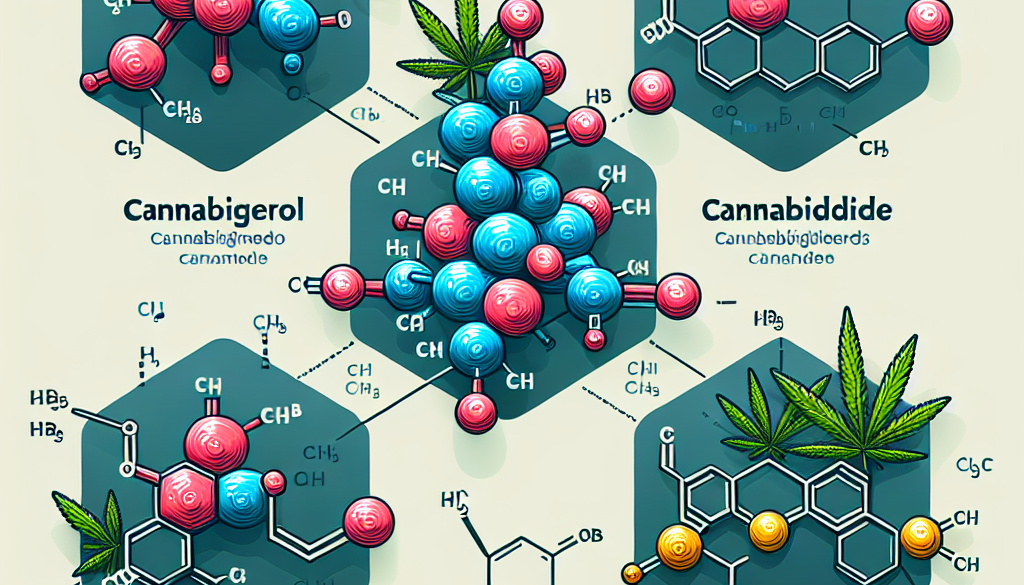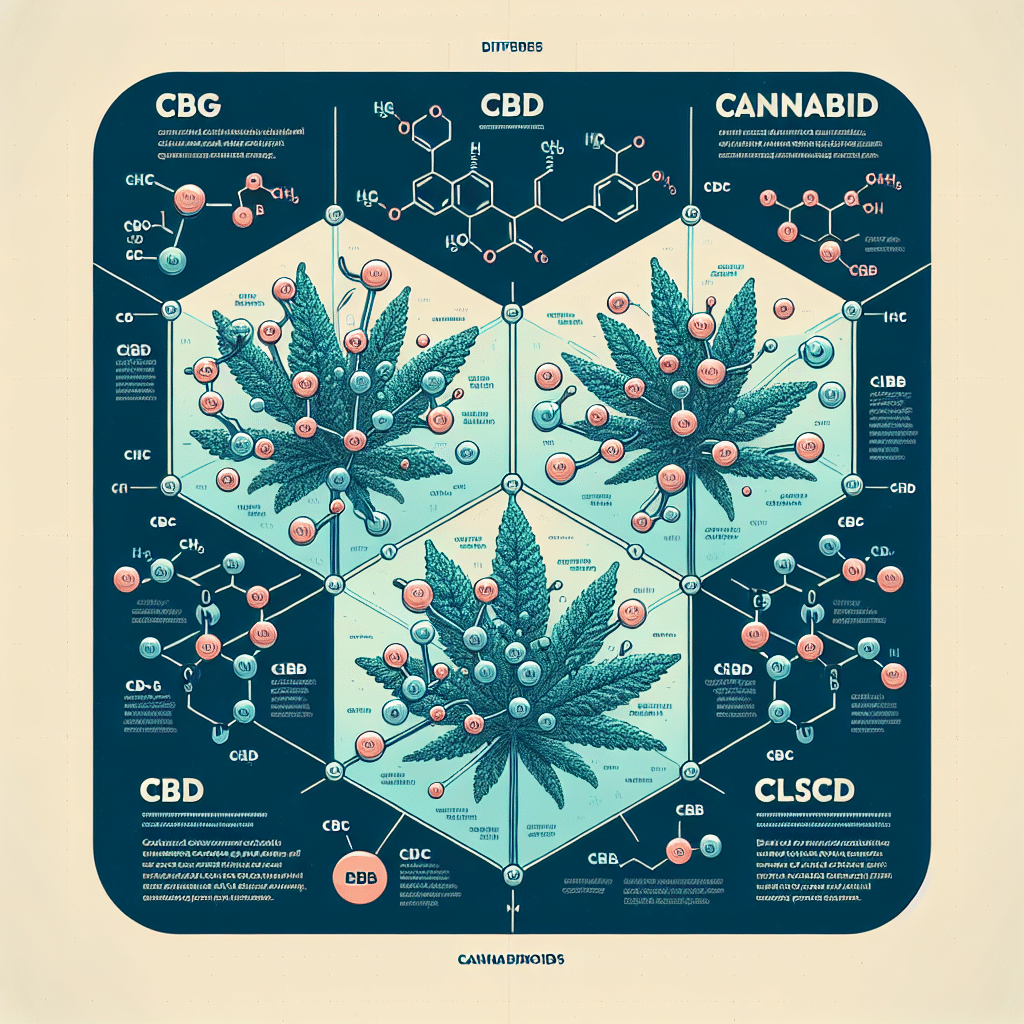CBG vs CBD vs CBC: Explained
-
Table of Contents
CBG vs CBD vs CBC: Understanding the Differences and Benefits
The world of cannabinoids is ever-expanding, with new compounds gaining attention for their unique effects and potential health benefits. Among these, Cannabigerol (CBG), Cannabidiol (CBD), and Cannabichromene (CBC) stand out as three non-psychoactive cannabinoids that have sparked interest in both the scientific community and the general public. This article delves into the differences between CBG, CBD, and CBC, exploring their individual characteristics, potential health benefits, and the current state of research.
Introduction to Cannabinoids
Cannabinoids are a class of diverse chemical compounds that act on cannabinoid receptors in the body. These receptors are part of the endocannabinoid system, which plays a crucial role in regulating a range of physiological processes, including pain sensation, mood, appetite, and memory. While THC (Tetrahydrocannabinol) is the most well-known cannabinoid due to its psychoactive effects, non-psychoactive cannabinoids like CBG, CBD, and CBC have gained popularity for their therapeutic potential without the “high.”
What is CBG (Cannabigerol)?
CBG is often referred to as the “mother of all cannabinoids” because it is the precursor from which other cannabinoids are synthesized. It is typically found in low concentrations in most cannabis strains, which has historically made it less commercially viable. However, recent research into its potential benefits has led to increased interest in this compound.
- Potential Benefits: CBG has been studied for its possible neuroprotective, anti-inflammatory, and antibacterial properties. It may also have implications in treating conditions such as glaucoma, inflammatory bowel disease, and certain types of cancer.
- Current Research: While research on CBG is still in its early stages, preliminary studies have shown promising results. However, more extensive clinical trials are needed to fully understand its effects and therapeutic potential.
What is CBD (Cannabidiol)?
CBD is the most well-known non-psychoactive cannabinoid and has been extensively studied for its potential health benefits. It is found in higher concentrations in hemp plants and has been the subject of numerous scientific studies and clinical trials.
- Potential Benefits: CBD is recognized for its anti-inflammatory, analgesic, anti-anxiety, and seizure-suppressant properties. It has been approved by the FDA in the form of Epidiolex for the treatment of certain types of epilepsy.
- Current Research: Ongoing research is exploring the use of CBD in treating a wide range of conditions, including anxiety disorders, chronic pain, and neurodegenerative diseases. Its safety profile and lack of psychoactive effects make it an attractive option for therapeutic use.
What is CBC (Cannabichromene)?
CBC is another non-psychoactive cannabinoid that is less well-known than CBD but has been gaining attention for its potential health benefits. Like CBG, CBC is present in lower concentrations in cannabis plants.
- Potential Benefits: CBC has been studied for its potential to promote neurogenesis (growth and development of nervous tissue) and for its anti-inflammatory and analgesic effects. It may also have antidepressant properties.
- Current Research: Research on CBC is still in the preliminary stages, with most studies being preclinical. However, the results so far suggest that CBC could play a role in the overall therapeutic effects of cannabis.
Comparing CBG, CBD, and CBC
While CBG, CBD, and CBC share some similarities, they also have distinct differences in their molecular structure, concentrations in cannabis plants, and their interactions with the body’s endocannabinoid system. Here’s a comparative overview:
- Molecular Structure: Each cannabinoid has a unique chemical structure that influences its effects on the body.
- Concentration in Cannabis: CBD is typically found in higher concentrations, especially in hemp, while CBG and CBC are found in lower amounts.
- Interaction with Endocannabinoid System: CBD and CBC interact with different receptors in the endocannabinoid system, while CBG acts as a precursor to both THC and CBD.
- Therapeutic Potential: All three cannabinoids have shown potential in various therapeutic applications, but CBD is currently the most researched and utilized.
Case Studies and Statistics
Several case studies and statistics highlight the growing interest in cannabinoids for therapeutic use:
- A survey conducted by the Brightfield Group found that 60% of CBD users reported using it for anxiety.
- Preclinical studies on CBG have demonstrated its potential in treating conditions like Huntington’s disease and colorectal cancer.
- CBC has been shown to possess significant anti-inflammatory properties in animal models, which could be beneficial for conditions like arthritis.
Conclusion: Key Takeaways
In conclusion, CBG, CBD, and CBC each offer unique benefits and potential applications in the realm of health and wellness. While CBD remains the most studied and widely used cannabinoid, emerging research on CBG and CBC is uncovering new possibilities for these lesser-known compounds. As the scientific community continues to explore the therapeutic potential of cannabinoids, we can expect to see further developments in their use for a variety of conditions.
Discover ETchem’s Protein Products
For those interested in the health and wellness industry, ETchem’s protein products offer high-quality solutions. ETchem, a reputable Chinese Collagen factory manufacturer and supplier, provides a range of collagen products that cater to various industries, including nutraceuticals, pharmaceuticals, and food and beverage. Their offerings are characterized by neutral taste and instant solubility, making them ideal for incorporation into a variety of products.
About ETChem:
ETChem, a reputable Chinese Collagen factory manufacturer and supplier, is renowned for producing, stocking, exporting, and delivering the highest quality collagens. They include marine collagen, fish collagen, bovine collagen, chicken collagen, type I collagen, type II collagen and type III collagen etc. Their offerings, characterized by a neutral taste, instant solubility attributes, cater to a diverse range of industries. They serve nutraceutical, pharmaceutical, cosmeceutical, veterinary, as well as food and beverage finished product distributors, traders, and manufacturers across Europe, USA, Canada, Australia, Thailand, Japan, Korea, Brazil, and Chile, among others.
ETChem specialization includes exporting and delivering tailor-made collagen powder and finished collagen nutritional supplements. Their extensive product range covers sectors like Food and Beverage, Sports Nutrition, Weight Management, Dietary Supplements, Health and Wellness Products, ensuring comprehensive solutions to meet all your protein needs.
As a trusted company by leading global food and beverage brands and Fortune 500 companies, ETChem reinforces China’s reputation in the global arena. For more information or to sample their products, please contact them and email karen(at)et-chem.com today.





